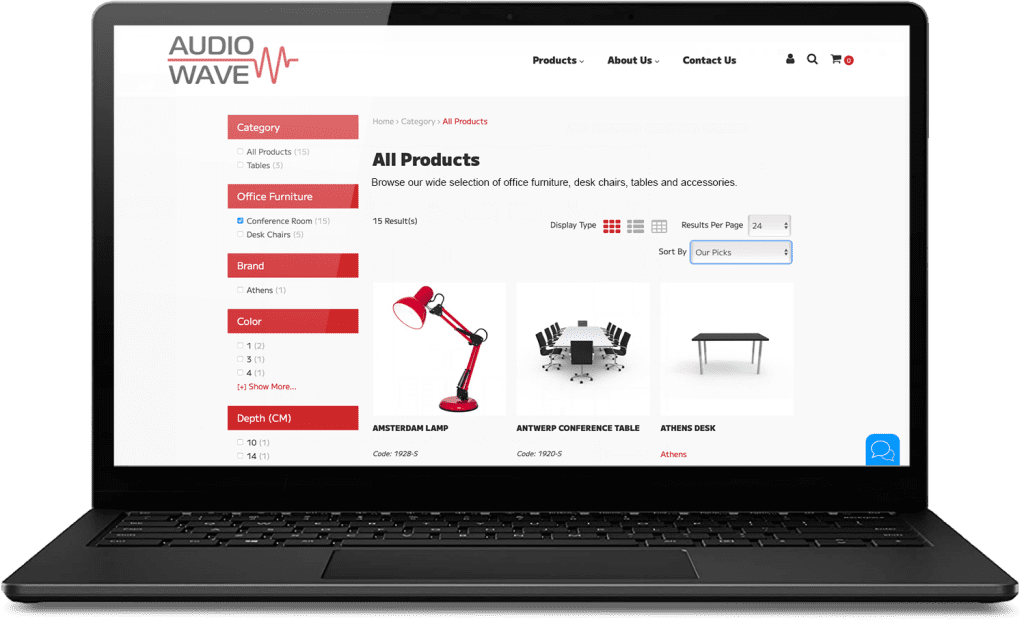
See how B2B trends and buyer needs shape your future in our new eBook.
Create an efficient and secure way to do business
Shorten the sales cycle and benefit from better margins
Personalize your clients shopping experience
Create an efficient and secure way to do business
Shorten the sales cycle and benefit from better margins
Personalize your clients shopping experience

Empower your buyers with a B2B customer portal. It’s time for better buyer enablement and sales support in B2B. Here’s how an online service portal makes it not just possible, but easy, to empower and serve digitally-inclined customers.

We used to think of B2B websites as procurement-focused channels, where customers could access a large product catalog and place orders. But doing so often involved a time-consuming process of entering individual SKUs or uploading a CSV file, with few capabilities to expedite the journey or to self-serve further.
Now, we’re not only seeing more sophisticated B2B ecommerce sites that put the customer experience first. We’re also seeing an explosion in the popularity of B2B customer portals.
Why?
Still, while self-service options are preferred by a majority of buyers in B2B, many still value personalized interactions and guidance from sales reps.
Knowing this, B2B vendors offering customer portals should aim to strike a balance between self-service capabilities and personalized support.
B2B portals make comprehensive product and pricing data always available, on demand, to the customer. They feature powerful search tools that connect customers to items quickly. And a B2B portal, most often, gives your buyers (and your sales and service reps) a simple way to access, view, and manage:
A B2B portal streamlines bulk ordering, tailors pricing and payment terms, simplifies re-ordering, and offers a specialized product catalog for an enhanced user experience. Which means you can empower your buyers to handle some or all of the purchase process on their own, while providing your teams a way to offer fast support as needed.
Think: a secure way for a B2B purchaser to view product options, place orders, track shipments, view and pay invoices, and communicate with their vendor — all from a single platform.


To be as effective at streamlining the customer experience as possible, a successful B2B customer portal should be equipped with features including:
Integrating B2B customer portals gives ecommerce businesses the ability to simplify their operations and support various customer needs no matter who they are:
“In all buying stages, B2B buyers use tools to complete tasks and purchases on their own. Reassuringly, they still value interactions with sales reps and product experts. However, sales teams haven’t kept up with the digital practices of buyers, leading to thinner pipelines, longer sales cycles, and greater customer frustration.
In 2023, 63% of B2B businesses said digital buying behaviors would have a significant impact on their organization in the next two years. But so far, only 37% have made digitizing the buyer journey a top priority.”
Today, modern buyers spend just 17% of their total purchase journey interacting directly with a sales representative. That means your team is hands-off for over 80% of the time your buyer spends purchasing, and that reliable self-service capabilities are non-negotiable for B2B leaders.
of B2B buyers’ purchase journey is spent independently, free of interaction with a sales rep.
Fortunately, an online portal your buyers can count on stands to come with a major payoff.
With a B2B self-service portal, you can create a comprehensive knowledge base with FAQs, tutorials, and product guides tailored for your clients. This allows them to find answers to their questions so they can make informed decisions about their purchases without reaching out to the support team. On their own time, customers can manage their accounts, update personal details, and more.
But why is your ERP such a crucial part of the equation? And what does your team stand to gain from it all?
On the customer side, ERP integration means that your clients are always getting comprehensive, up-to-date product and pricing information from your customer portal. They can see which products are available, how much they cost, and always get complete product data. But just as importantly, this same information is available to your sales reps.
ERP integration streamlines your company’s business data, including pricing information. It ensures that a single version of all data exists in a unified database. This eliminates the information silo problem many B2B companies struggle with. When customers come to your team with questions, your reps have all the answers at their fingertips. This helps build a more customer-centric relationship in which the sales rep acts as an advisor to the client, and they both get the benefit of interacting from one portal.
At k-ecommerce, we make this possible through capabilities for:

A B2B customer portal powered by ERP can serve as your sales reps’ all-in-one tool for buyer enablement — guaranteed to help them boost productivity. With k-ecommerce, you can also count on a B2B solution with the highest level of security compliance, so your buyers’ data stays protected at all times.
A B2B customer portal with k-ecommerce can help your teams work faster, smarter, and with more peace of mind.
To help get unconvinced sales reps on board with a customer portal, ask:
Getting specific with your orders?
With k-ecommerce B2B portals, using quick-order codes (think: product codes, customer codes, SKUs, customer-specific codes, or supplier codes) helps buyers build and place orders with fewer errors and lots of time saved.
Want a better way to tackle your day-to-day tasks?
With a B2B portal, sales reps can access complete customer profiles to understand each client’s buying patterns and tailor their sales approach accordingly. They can also check product availability and inventory levels in real time to provide accurate information and even upsell or cross-sell related items.
A sales portal also equips your team by:
Worried about the security of online B2B channels?
B2B purchases often involve large amounts of money and sensitive data. So, in turn, B2B customer portals typically have robust security features like intrusion detection systems, firewalls, and secure sockets layer (SSL) encryption to protect customer data and transactions.
For example, k-ecommerce’s PCI certification protects your customers’ credit card data and gives them the highest level of security possible. Plus, our cloud is fully PCI-DSS (Payment Card Industry Data Security Standard) certified, which makes it even easier for your business to comply with PCI-DSS.
The most successful B2B players sharpen their sales capabilities with a mix of top tactics. Among them? Omnichannel sales and service teams. Advanced technology and automation. Data-powered hyper-personalization.
In fact:
With such a major advantage up for grabs, it comes as no surprise that B2B businesses are continuing to invest in customer portals for improved buyer interactions. Across channels, whether your buyers are shopping on a mobile device, via phone, or on your website, it’s essential to be able to meet, sell, and serve customers where they are.
A customer portal powered by up-to-the-minute ERP data is just the tool to make it possible.

With k-ecommerce, you can scale your B2B operations with confidence: never having to sacrifice your margins, your ways of working, or your performance. (That’s true even if you’re switching or between ERP systems.)
That’s the k-ecommerce promise.

ERP integration is critical for the success of a B2B customer portal, and k-ecommerce gives you support for many of the most popular platforms in use today. When you choose to use the k-ecommerce platform in your setup, you can experience:


"We didn’t want the typical web store layout. We wanted more of a product listing, with standard order quantities and customer-specific pricing, where they could quickly key in and submit their order."
David Harris
President, John R. White
